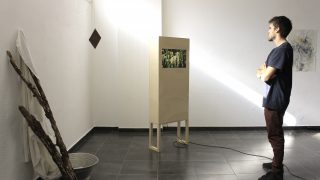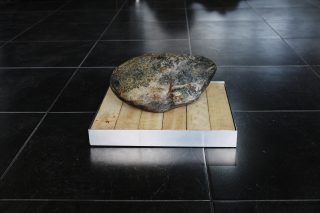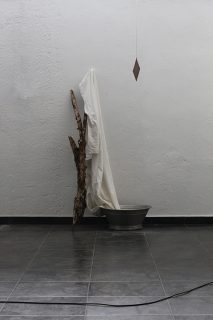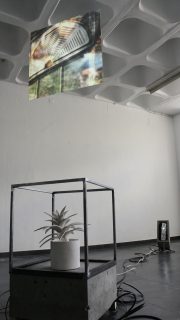MFA Transdisciplinary New Media Student Collin Kluchman Exhibits in Portugal!

Prelúdio represents the results of two multidisciplinary collaborative projects conceptualized by MFA students from the Faculty of Fine Arts of the University of Porto and Paris College of Art.
Works Planted Forth, by Collin Kluchman and Felipe Rocio, and Descida às águas by Collin Kluchman and Fábio Araújo, compose the first installment of this exhibition series to be continued in Paris.

Though the two works represent disparate formal concerns and critical discourses, commonalities may be found in the way each project deals with flows of energy and haptic experiences.
Planted Forth investigates the way modern technology enframes natural objects to extract anaesthetized essence, and Descida às águas investigates a life-cycle of non-presence through a mythical performative action.

Collin Kluchman is an experimental filmmaker and video installation artist. He is currently working to receive his MFA in transdisciplinary new media at Paris College of Art, France (2018-2020), and completed an undergraduate degree in English literature and film studies at Colorado College (2014-2018). He worked in documentary post-production to hone his technical skills at video editing and project management and has created projections for multiple dance and musical performances as well as immersive multi-channel video installations.


He has received multiple grants to work in documentary post-production. His visual work always centers around the human body and the medium of video with a strong conceptual backing in philosophy and critical theory. Currently, Collin is exploring the way digitally mediated experience and screens complicate and expand human physicality.
“My work questions the limits of the human body. I see the body as inseparable from environment and use this perspective to investigate distinctions between virtual and actual. In our contemporary, digitized world we have the ability to exist in multiple spaces at once.
Accordingly, I am interested in the way objects augment the human form and increase our understanding of it. Video editing techniques that emphasize the physical relationship between viewers and screens are central to my work. I aim to provide viewers with an initial visceral screen-experience that acts as a basis for further reflection.
This physical relationship between my video-screens and the bodies of viewers underscores the way digital and screen-based media can be understood to augment the body. Ultimately, my work strives to extend a monistic view of mind-body relationships to an equally unified notion of digital and physical.”
More information about Collin’s work here.